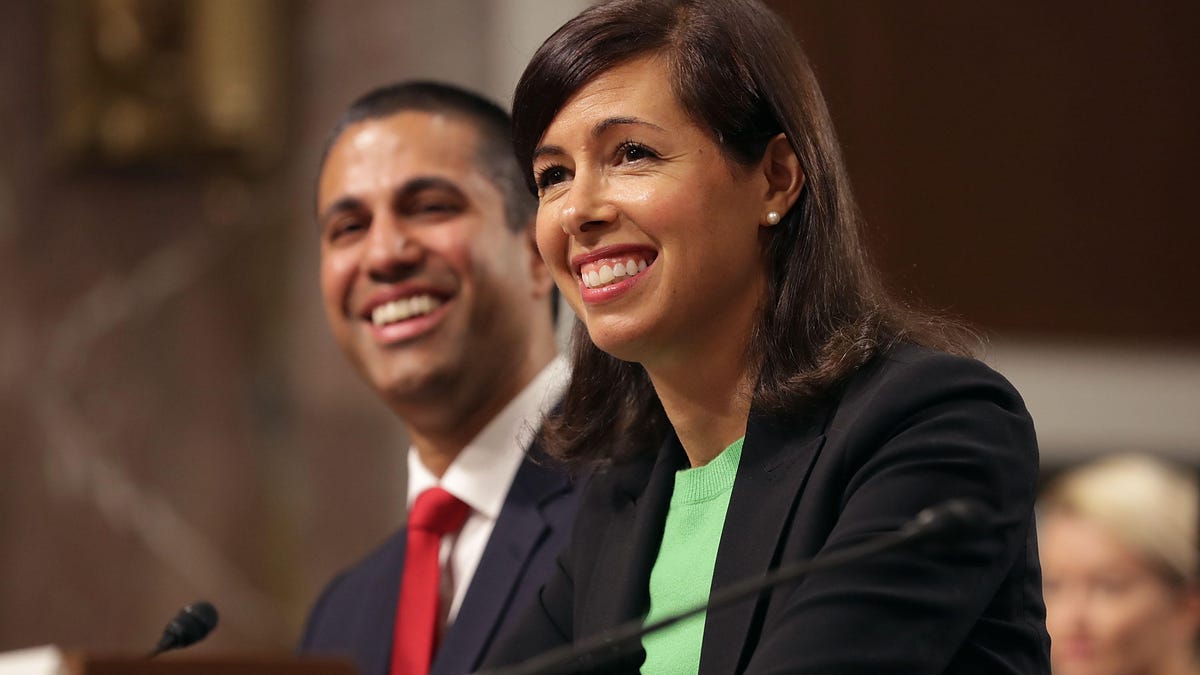No, the FCC won't charge you $225 to complain about robocalls, Pai says
FCC chairman Ajit Pai says critics have it wrong, the agency isn't changing its informal complaint process. Others aren't so sure.

Federal Communications Commission Chairman Ajit Pai (left) and Commissioner Jessica Rosenworcel testify before the Senate Commerce, Science and Transportation Committee during their confirmation hearing in July 2017.
The chairman of the Federal Communications Commission says the agency won't charge consumers $225 to lodge a complaint about a phone provider.
During the FCC's monthly meeting Thursday, Chairman Ajit Pai tried to clear up what he says is a misunderstanding about changes to the commission's complaint process. The FCC voted 3-1 to finalize a proposal that some of its members say will "streamline and consolidate" rules for filing complaints against phone companies. The revised rules consolidate regulations that'd been adopted over the past several decades, and they apply common deadlines for answering formal complaints and add a shot clock to complaints about pole attachments.
But some Democrats, like Commissioner Jessica Rosenworcel and Democratic leaders of the House Energy & Commerce Committee, Reps. Frank Pallone of New Jersey and Mike Doyle of Pennsylvania, say changes to the text of a subsection of the rules also alter the way the FCC handles informal complaints.
They say the new wording, in the appendix of the rules, implies the agency will simply forward to companies informal complaints about things like unwanted robocalls or problems porting your phone number to a new carrier. And, they say, if consumers aren't satisfied with the eventual outcome, their only recourse will be to file a formal complaint for a fee of $225. They say this is a big change from how the agency has historically handled such complaints.
"Our current language says the agency has a duty to figure out a way to get an issue resolved," Rosenworcel said during a press conference following the meeting. "That's a good policy. I do not understand why we would want to change it."
Pallone and Doyle sent a letter to Pai expressing concern that the changes defy the agency's mandate to work in the public interest. Rosenworcel called the supposed policy change "bonkers."
"No one should be asked to pay $225 for this agency to do its job," Rosenworcel said in her formal statement at the FCC meeting. "No one should see this agency close its doors to everyday consumers looking for assistance in a marketplace that can be bewildering to navigate."
But Pai denied that the changed text means a change in policy. He said the agency will still try to help consumers resolve issues through its informal complaint process. He said the new wording was simply to codify an existing process the FCC has used for decades to handle informal complaints.
To make his point, he asked an FCC staff member presenting the item at the meeting whether the change in wording would result in consumers paying $225 to have their concerns reviewed by the agency. Her answer: "No, those reports are false."
Pai also pointed out during the meeting that no commissioner had opposed the revised wording of the item with respect to the informal complaint process when it was open for public comment in September 2017.
Still, Rosenworcel complained during the meeting that she'd received the final text of the order only an hour after Thursday's meeting had begun. She also said she'd thought she and her Republican colleagues had reached an agreement based on her concerns -- something The Washington Post had reported on Wednesday, citing unnamed sources. But Rosenworcel said those changes didn't make it into the final text.
"I believed when I left this building last night that we had an agreement to fix this," Rosenworcel said. "They agreed to take out the language at my request and then rescinded that agreement."
Cambridge Analytica: Everything you need to know about Facebook's data mining scandal.
Logging Out: Welcome to the crossroads of online life and the afterlife.

